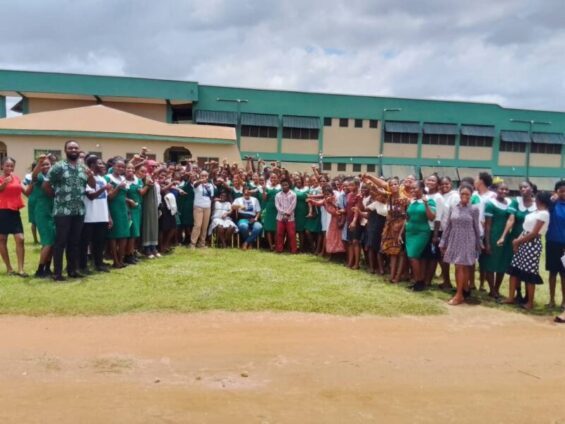
Audio By Carbonatix
The Ghana Integrity Initiative (GII) has cautioned first-time voters against electoral offences, as the December 7, polls gather momentum.
GII is the Ghana chapter of Transparency International (IT), the global, non-profit civil society organisation leading the fight against corruption.
The Executive Director, GII, Mary Awelana Addah, who gave the advice said electoral offences had severe penalties and urged first-time voters to be guarded and stand against the temptation of breaching the electoral laws.
She was speaking at a sensitisation workshop on the “Youth voice: activating first-time voters for Ghana’s General Elections” project for students of the Holy Family Nursing and Midwifery College at Techiman, the Bono East Regional capital.
The GII in collaboration with the Ghana Anti-Corruption Coalition (GACC) is implementing the project with funding from the United States Embassy in Accra and aimed at empowering first-time voters on voting and electoral integrity.
Mrs Addah said impersonating another voter, engaging in violence, intimidation, or bribery, tampering with electoral materials as well as creating confusion and misunderstandings at polling stations were all punishable by law.
“The Electoral Commission ensures strict enforcement of Ghana’s electoral laws, and violators face severe penalties”, she told the students.
Touching on the project, Mrs Addah explained that by understanding the voting process, the roles of electoral institutions, and the measures to ensure electoral integrity, first-time voters could make informed and confident decisions on Election Day.
“Note that every vote counts, and it is therefore vital that you exercise this important civic responsibility. Also, embrace peaceful participation and avoid any forms of aggression or violence”, she advised.
Mrs Addah that elections were an opportunity for peaceful democratic expression and advised first-time voters to make informed decisions when they go to the polls.
She explained that first-time voters played a crucial role in shaping the future and consolidating the gains of the nation’s democracy as their participation in the electoral process strengthened the democratic foundation and ensured the reflection of diverse views in governance.
“However, young or first-time voters often face challenges, or lack understanding of the voting process, and suffer voter apathy”, Mrs Addah stated, saying “Educating these voters is essential in fostering informed participation, which enhances transparency, accountability, and overall credibility of elections”.
Latest Stories
-
Victoria Bright: Weak institutions make presidential term extension risky
16 minutes -
Police net 120 suspects in major East Legon drug and crime swoop
21 minutes -
Three suspected armed robbers shot dead by Police in Ashanti region
31 minutes -
Why Ghana’s Constitution Review Committee’s Work Should Be Extended to Strategic Communication
35 minutes -
Prof. Prempeh defends lowering presidential age, cites Kufuor’s early leadership roles
52 minutes -
Presidential Age Limit: Unrestricted democracy could breed chaos – Prof. Agyeman-Duah warns
1 hour -
MP Baffour Awuah advocates for legal framework on presidential continuity, not term extension
1 hour -
Ghanaians entitled to propose constitutional changes – Charlotte Osei
1 hour -
At 30, you lack the experience to be a President – Prof Agyeman-Duah
1 hour -
One-year extension of presidential term unnecessary – Baffuor Awuah
1 hour -
Sam George lauds coordinated crackdown on cybercrime in Tabora and Lashibi
1 hour -
100 arrested in Accra’s Tabora in major Mobile Money fraud crackdown
1 hour -
BOG put GH¢4.69bn into gold-for-oil, lost over GH¢2.1bn with no impact — Audits show
2 hours -
CRC opted for broader reforms over abolishing ex-gratia – Charlotte Osei
2 hours -
Mahama’s record shows four-year presidential term is sufficient – Inusah Fuseini
2 hours

